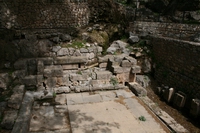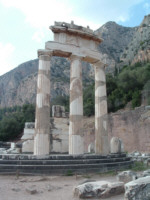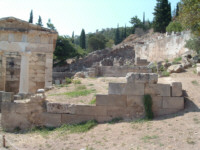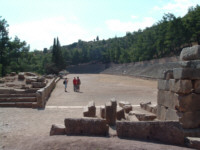DELFI Δελφοί
Edited by Giorgio Manusakis
Delphi, also known as Pito since Homeric age, is a village in the Focide, by the side of Mount Parnassos, centre of one of the most important archaeological sites of the world; more in detail, besides the necropolis by the mountain, the archaeological site is divided into two main areas.
Between them there is the Kastalia spring, a sacred source for ancient Greeks. The lower area lies by the slopes of the eastern Phaidriades and includes the remains of a gymnasium with baths; a little bit further you find the sanctuary of Athena Pronaia, who was thought to be born there, and a round Tholos partly rebuilt, with a peristyle of twenty Doric columns.
The upper area, instead, lies by the slopes of the western Phaidriades and includes many votive monuments, exedras, plinths for statues and a long set of Treasures (small buildings resembling the form of temples): the Sikyonians’, the Siphnians’, the Athenians’, the Knidians’, the Spartans’ and so on. Further on you find the Bouleuterion or Parliament, the Ionic Column that supported the the Naxians sphinx and the “rock of the Sibyl” with the tomb of the snake Python, and finally the temple of Apollo, the Delphic divinity par excellence.
Going up you find the ancient theatre and the stadium where the famous Pythian games used to take place. Delphi was also home for the Omphalos, “the Umbilicus of the world”, a white rock with a semi-cone shape; in fact according to the myth Zeus, to find out where the centre of the Earth was, let two eagles (or swans) fly simultaneously from its extreme limits and the two birds met in Delphi.
Delphi was certainly the most important religious centre of the ancient time, no important decision, whether personal or of general interesting, was taken without consulting the prophetical god Apollo; he spoke through the mouth of his priestess, the famous Pythia who, with a laurel-leaf in her mouth and a twig in her hand, sitting on the sacred tripod, went into raptures.
Then, priests would explain her movements and sounds based on the canons of their erudition, translating them in intelligible form and writing them in prose or verses (hexameters), showing which god they had to offer sacrifices to so in order to successfully achieve the objective, what they had to do to overcome particular obstacles, possible rites to expiate blames, etc.
The power of the oracle and his political influence were so strong that some historians have talked about “delphical politics”, marked with a moderation spirit. To tell the truth, the prophecies of the god, even if written, were not easy to understand, so the different interpretations given served who “read again” them at his advantage and, anyway, gave rise to many myths, that is more interesting for us.
Focusing on the principal theme of our web site, the myth, the origins of the Delphic’s oracle goes back at the same age when the gods emerged from the chaos and the first goddess who possessed the Delphic land was the Earth; then she gave it to her daughter Themis, who in her turn gave it to the titan Febe who subsequently offered it as a born gift to Apollo, who assumed from her also the epithet Febo Apollo.
Aeschylus tells all this in “Eumenidi” but we have also a less “divine” version about the Oracle of Delphi. In fact, according to other sources, including Diodoro, it was Coreta, a shepherd from that area, who discovered the prophetical virtues of Delphi.
He noticed that his goats, approching a particular cleft of the ground, went into excitement. So, to understand the reason of that behaviour, he went to look into the cleft and immediately started to prophesy.
On that cleft was placed the famous tripod, where since then the prophetess Pythia is sitting, to better absorb the vapours released and to be closer to the god.
As we said, Delphi was also known as Pito; with this name, in fact, Homer calls the sanctuary in his poems.
The name Pito, according to what the Homeric Hymn to Apollo says, derives from “pythesthai” that in Greek means “ to rot”.
To better understand the reason we must, of course, refer to the myth; in fact it says that Apollo, once admitted on the Olympus, went down to find a residence on the Earth where to erect a sanctuary; initially, he went to the spring Telfusa (or Tilfussa), but the incautious spring persuaded him to go to the Mount Parnassos where there was another source, the spring Kastalia.
But that spring was protected by the Dracena, a female dragon. In fact, the Dracena wasn’t only the spring’s keeper, alsto the monster Typhoon had been committed to her. Typhoon had been procreated by Era herself to revenge herself on Zeus after that he had procreated Athena by himself from his head. For this tale, please refer to other myths.
The fact is that Apollo, who didn’t want her company, killed her with a potent arrow “…and since then Pito has this name, and people call the god with the epithet Pizio, because in that place the power of the burning Sun made the monster to rot.” (Homeric Hymn to Apollo).
The myth continues explaining the origin of the name Delphi, too. In fact Apollo, after founding the sanctuary, starts searching the priests to commit it to. The choice, for unknown reasons, fell on a Cretans merchants’ ship; the god not even tried to persuaded them to become his priests, but he transformed himself in an enormous dolphin and dragged them with their ship to the port of Crisa, then he transformed himself in a beautiful young boy and explained to the Cretans merchants the life that he had chosen for them, assuring them that it would be very convenient for them; he led them to the sanctuary and decided that place would be called Delphi, because he had apperead in a dolphin shape to his devouts.
We already said that no important decision was taken without consulting the oracle and that by this fact many myths derive.
We are not going to list all of them here, but you can find them clicking on the appropriate pages of our web site.
We'll now rather focus on the more properly local myths.
Coming back to the Dracena, we must say that she was considered sacred because she was a primordial being; for this reason Apollo had to purify himself because he had killed her; in order to do this, he was an herdsman for Admeto, king of Fere in Tessaglia, who then gained the friendship and the protection of the god. For this reason every eight years in Delphi took place the Septerione, a celebration for the expiation of the Apollo’s crime. We are not going to talk about this for the sake of synthesis.
Not everybody knows that Delphi was sacred to another god too, Dionysus. On the Parnassos, in fact, the Tiadi, women sacred to Dionysus as the Bacchantes, celebrated the sacred orgies and the Parnassos, with his two peaks, according to Lucano “ searches the sky with two peaks, being sacred to Febo and Bromo” the epithets of Apollo and Dionysus.
In Delphi they believed that during the three winter months, Apollo went to visit the people of the Iperborei that he loved and in those three months it was Dionysus who took care of the sanctuary.
As home to Apollo, the god of poetry, the land of Delphi was also considered the residence of the Muses. In this regard, we wish to recall another mountain near the Parnassos, often quoted by poets: Elicona. In the Theogony, Esiodo says that there he met the Muses and they introduced him to the singing. From Elicona rose also the Muses’ favourite spring, the Ippocrene; the myth says that, when the Muses arrived on Elicona, they started to sing so divinely that the mountain, for vanity, pride or enthusiasm, swelled till it almost touched the sky; so Poseidon intervened and ordered to he winged horse Pegasus to plant a kick to Elicona, so the mountain started to deflate and from the point where it was hit rose the spring Ippocrene, that means “horse’s spring”.

As stated above, in Delphi took also place the Pythian races; those races, before changing in the Pythian Games, smaller only than the Olympia ones, originally were conceived like a musical contest for cithara players, because it was tought that Apollo had celebrated his victory on the Dracena playing a hymn with the cithara.
In this regard, a myth told by Clemente from Alexandria, tells us that Eunomo from Locri, during one of this musical contests for cithara players, broke one string of his cithara while he was playing the hymn of the Dracena’s killing; at that moment one cicada, an animal sacred to the Muses, took the place of the broken string playing perfectly what Eunomo was playing. So Eunomo won the musical contest and got also a bronze statue with his precious friend.
Emperor Teodosio, in year 393 a.C., with an edict ordered the end of the Olimpic games and one year later, 394 a.C., the closing of the sanctuary of Delphi.
In the 363 a.C., thirty one years before, Emperor Julian the Apostate, who tried to preserve the ancient religion from the Christianity — the most powerful religion at that time — received the last oracle from the sanctuary of Delphi, which said to the Emperor: “go and report to the king that the beautiful building is down, Apollo has no more hut neither laurel, the spring is dry up and the gurgle water is mute.” We think we are right in saying that never a prophecy was more true.
|
view the Sacred way
|
view the sacred way
|
|
|
Tholos of Athena pronaia
|
||
































